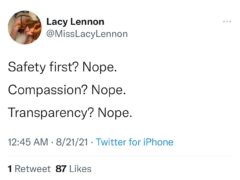Fred writes:
I read the AVN article re Brooke Ashley and Workman’s Comp. According to the article, if Ms. Ashley was found to be an "employee" (as opposed to an independent contractor), "Dupree would be required to pay workers compensation to Ashley, or if for some reason Dupree were unable to do so, Ashley’s compensation would be paid from the Uninsured Employees’ Benefit Trust Fund." (Query whether this means that the taxpayers would pick up the tab for this mess.)
The testimony recounted in the article is morbidly interesting. Ran Munee (sp?) was hired to work as the cook on the shoot "but soon found himself drafted into the production manager’s job, one of his duties then becoming the collector of the HIV tests from the performers." You could tell that monitoring these tests was a really high priority for the film maker.
Ms. Brooke then went on to have anal sex with about 50 guys, most of it unprotected, including with a person who was HIV positive. (According to AVN’s article, Munee said he was suspicious about the individual’s HIV paperwork, but "Dan Beck came in and said, ‘No, no, that’s good; we need a name.’")
As mentioned above, a major issue in this case is whether Ms. Brooke was an "employee" or an "independent contractor." As I understand it, an independent contractor is "any person who renders service for a specified recompense for a specified result, under the control of his principal as to the result of his work only and not as to the means by which such result is accomplished." (Cal Labor Code 3353)
I know nothing about workmans comp, or how this definition applies to a porno actress (or for that matter, any actress).
What comes out of this article is a story of lots of people acting unbelievably irresponsibly, causing enormous health problems, and then asking a court to sort out the consequences.
It would be interesting to see whether the court is swayed by the hardships dumped on Ms. Ashely (as upposed to merely following the letter of the law, come what may).
Luke, when the opinion comes down, you should publish a copy of it.
As for whether this will impact the adult business, it would be interesting to see what kind of insurance company is willing to insure porn producers against HIV and other diseases. (Query: when a porn actor or actress tries to get health insurance, does he/she have to disclose to the insurance company what sort of job they do?)
Query: If it becomes untenable to make porn in California, will the shoots take place in Mexico or Canada?
Luke, as our moral leader, what is your position on this?
In any event, I doubt that this is the death knell for porn. Some people will produce porn on their own and ignore the law. Some operations will shut down. Perhaps more porn will be produced outside California. Perhaps it will become less profitable.











Well, the porn industry even is censorship goes away is vulnerable to attack in health issues. An the consenting adult argument in favor of porn becomes weaker if the taxpayer have to pick up the tab. That is the price of legitimacy I guess. You want to be treated as a legal industry, you will have the responsablities of a legal industry.
In a report that covered the Brooke Ashley story, “See Not Evil” the man who run the health policies of the Nevada Brothels said that the SoCal porn industry was acting as a defacto reservoir of STDs among Cali general population. And he would be very concerned if that situation happens in Nevada. And we shall not forget the mental health problems related to sex work. That is a unexplored avenue of legal attack.
The answer, porn will have to become more profesional. I do not think that moving to Canada with a large and agresive socialized health system or Mexico with no estable legal framework is the answer. Moving to Florida? There is already a mounting backlash here.
Solution, be more profesional, more legitimate. A positive outcome of a Brooke Ashely victory is that the law will recognize porn acting as a legitimate job.
Is it me, or has the porn fraternity done more to help the irresponsible Marc Wallice than they have for Brooke Ashley and the others hurt by his poor, in fact possibly lethal judgment. Has he ever been sued for fraud, and upon the death of one of those infected, shouldnt he be held criminally liable, together with the producers of gang bang movie.
Unfortunately, a lawsuit against Marc Wallice would probably be an expensive exercise in futility. It is unlikely that he has any assets that could be used to satisfy a judgment against him. I recall reading that when he was identified as the HIV source, his way of dealing with it was to burn through all his cash with a lengthy, intense coke binge.
As far as poor judgment is concerned, that is something that should also apply to any female performing in condomless anal gonzo sex.
And no one does nothing and the band plays on. Creating a vacuum in which soon or late goverment will step in.
In California, the question of whether someone is an independent contractor or an employee is decided by a variety of factors. The higher the degree of control exercised over the worker by the employing party, the more likely the Court is to find that the worker was an employee. The following blurb from the website for Sherman Oaks law firm Harris & Kaufman describes the analysis rather well:
Whether a worker is an “employee” or an “independent contractor” makes a big difference. Independent contractors are not entitled to many benefits that must be offered to employees, such as overtime pay, health and pension benefits, social security credits, protection against discrimination, and unemployment insurance. Some employers wrongly classify their workers as “independent contractors” to avoid providing those benefits. It is in your best interest to know whether you are properly classified as an employee or independent contractor.
Recently, there have been some noteworthy cases where employers mistakenly classified employees as independent contractors. The Allstate Insurance Company announced that it agreed to pay $19.5 million to 292 agents who claimed the good hands people wrongly changed their status from “employees” to “independent contractors” . This settlement came after Allstate settled the claims of another 1,000 agents for $22 million. In another case, Microsoft agreed to pay $96.9 million to employees who contended that they were not temporary, independent contractors but really permanent employees of Microsoft.
Courts use different tests for workers for deciding different issues, but there are some common principles. In wage and hour cases, they focus on the following factors:
The degree of control the employer exercises over the day-to-day work performed;
The amount of the worker’s investment in facilities and work equipment;
The worker’s opportunities for profit and loss;
The degree to which the worker’s independent initiative, judgment and planning is necessary for the success of the worker’s operation;
The permanency of the relationship between the employer and the worker;
The extent to which the services are a part of the employer’s business;
How dependent is the worker on the employer for continued work.
The courts will look to all the facts of a particular case and compare them to the appropriate factors. Thus, the employees should understand that an agreement that he or she is an independent contractor, though important, will not decide the case.